Choosing the right bathroom countertop material is a critical decision in bathroom design and renovation. The countertop is not only a functional surface but also a significant visual element that can set the tone for the entire space. With a variety of materials available, each with its own set of advantages and drawbacks, making an informed choice requires understanding the characteristics of each material and how they align with your needs, lifestyle, and aesthetic preferences. From natural stone to engineered surfaces, each option offers unique benefits in terms of durability, maintenance, cost, and style.
Natural stone countertops, such as granite, marble, and quartzite, are popular choices for their beauty and durability. Granite, for example, is a hard, dense stone that resists scratches and heat, making it an ideal choice for bathroom countertops that see heavy use. Its natural variations in color and pattern mean that every granite countertop is unique, adding a sense of luxury and individuality to the bathroom. Marble, on the other hand, offers a timeless elegance with its smooth, veined appearance. However, it is softer and more porous than granite, making it more susceptible to scratches, stains, and etching from acidic substances.
Engineered stone, such as quartz, has become increasingly popular in recent years for bathroom countertops. Quartz countertops are made from crushed natural quartz mixed with resin to create a hard, non-porous surface. This material offers the look of natural stone but with added benefits, such as greater consistency in color and pattern, and improved resistance to stains and bacteria. Quartz is also low maintenance, requiring no sealing, and is available in a wide range of colors and finishes, from solid colors to patterns that mimic the look of marble or granite.
Solid surface materials, such as Corian, offer a seamless, customizable option for bathroom countertops. Made from a blend of acrylic and polyester, solid surface countertops can be molded into various shapes, allowing for integrated sinks and backsplashes. This material is non-porous, making it resistant to stains and bacteria, and it can be easily repaired if scratched or damaged. While solid surfaces are not as heat-resistant as natural stone or quartz, their smooth, seamless appearance and wide range of colors and patterns make them a popular choice for modern bathrooms.
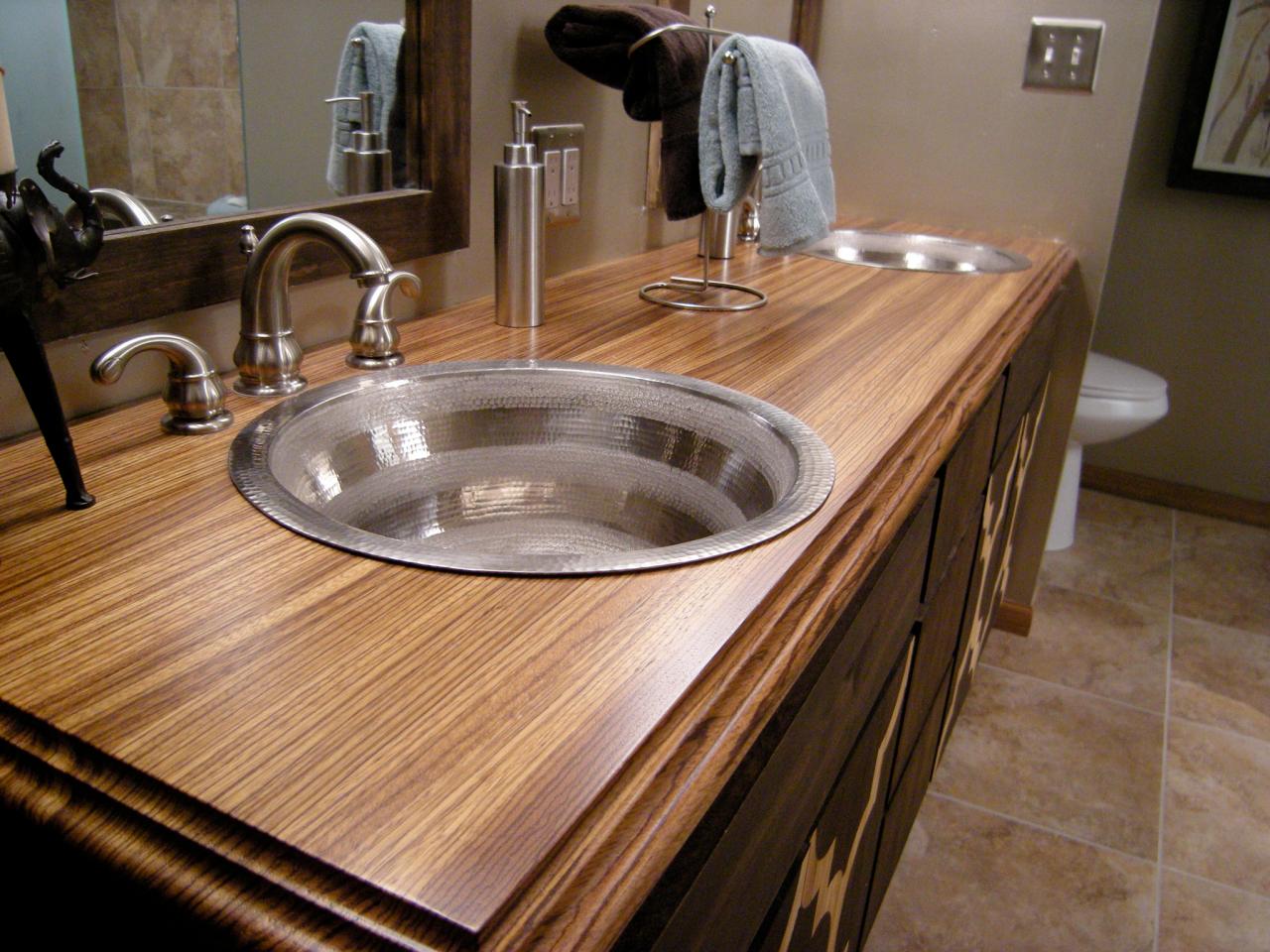
Laminate countertops are another budget-friendly option for bathrooms. Made from layers of plastic laminate bonded to a particleboard or plywood core, laminate countertops are available in an endless array of colors and patterns, including options that mimic the look of stone, wood, or metal. While laminate is not as durable or heat-resistant as other materials, it is water-resistant and easy to clean, making it a practical choice for bathrooms. However, laminate is prone to scratching and can be difficult to repair if damaged.
For those looking for a unique, eco-friendly option, recycled materials are an excellent choice for bathroom countertops. Recycled glass countertops, for example, are made from crushed glass embedded in a resin or concrete base. These countertops offer a distinctive, colorful look and are available in a wide range of designs, from smooth, polished surfaces to textured, terrazzo-like finishes. Recycled paper countertops, made from post-consumer paper combined with resin, are another sustainable option. These countertops are surprisingly durable, non-porous, and available in a variety of colors and finishes.
Concrete countertops offer a modern, industrial look for bathrooms. Made from a mix of cement, sand, and water, concrete countertops can be customized with pigments, stains, and textured finishes to create a one-of-a-kind surface. Concrete is incredibly durable and heat-resistant, but it is porous and must be sealed to prevent staining and water damage. Additionally, concrete countertops can develop hairline cracks over time, which are considered part of their natural patina but may not be desirable for everyone.
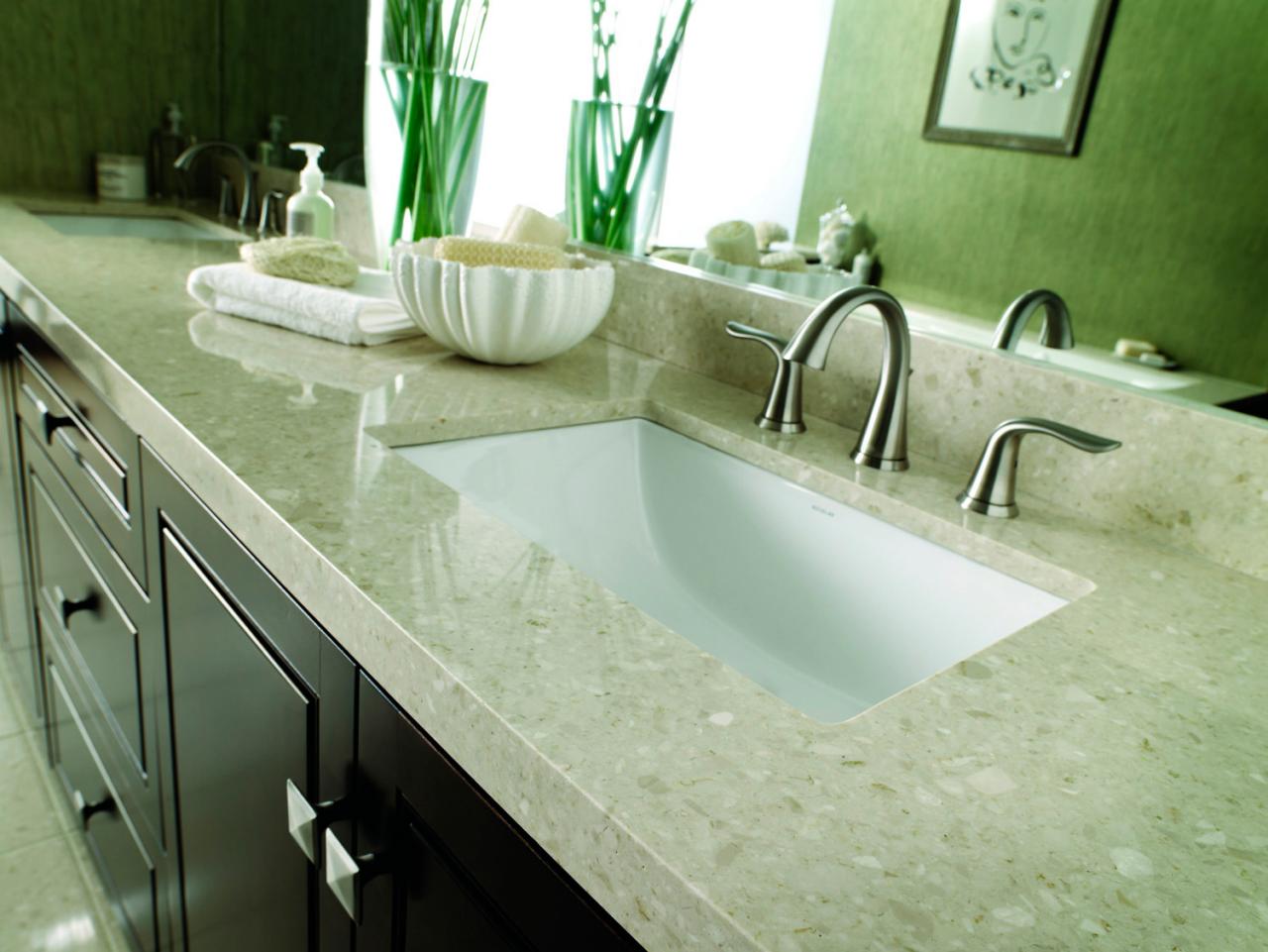
Wood countertops bring warmth and natural beauty to a bathroom, creating a cozy, inviting atmosphere. Woods like teak, walnut, and maple are popular choices for their durability and resistance to moisture. However, wood countertops require regular sealing and maintenance to protect against water damage and staining. Over time, wood can develop a rich patina that adds character, but it can also warp or crack if not properly cared for. For those willing to commit to the upkeep, wood countertops can add a unique, organic element to bathroom design.
Tile countertops, once a common choice for bathrooms, offer a wide range of design possibilities. Ceramic and porcelain tiles are durable, water-resistant, and available in an endless variety of colors, shapes, and patterns. They can be arranged in custom designs to create a truly personalized bathroom countertop. However, the grout lines between tiles can be prone to staining and require regular sealing and cleaning. Tile countertops are also more prone to chipping and cracking compared to solid surface materials.
Stainless steel countertops, while more commonly found in kitchens, can also be used in bathrooms for a sleek, modern look. Stainless steel is highly durable, heat-resistant, and non-porous, making it a hygienic choice for bathroom surfaces. It is also resistant to water and stains, although it can show fingerprints and scratches. The reflective surface of stainless steel can make a small bathroom feel larger and more open, but it may not be the best choice for those looking for a warmer, more inviting aesthetic.
Soapstone countertops are another natural stone option for bathrooms. Soapstone is a dense, non-porous material that is resistant to stains, heat, and bacteria, making it an excellent choice for bathrooms. It has a soft, matte finish and a smooth, soapy texture that gives it a unique, tactile appeal. While soapstone is durable, it is softer than granite or quartz and can develop scratches and dents over time. These can often be sanded out, and many homeowners appreciate the natural patina that develops with use.
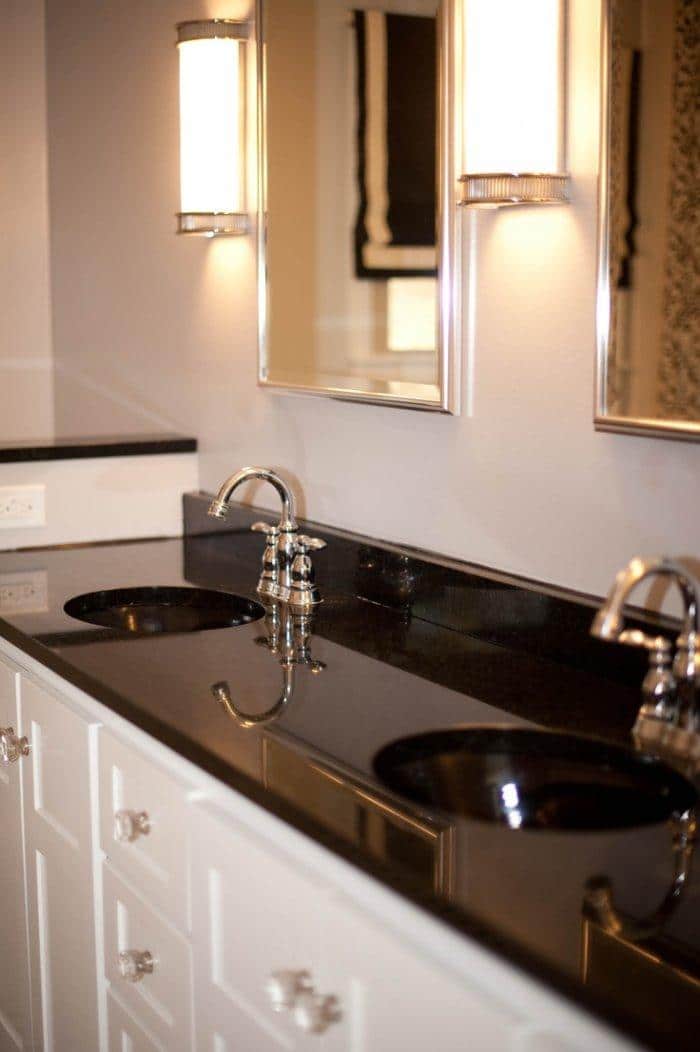
Glass countertops offer a sleek, contemporary look for bathrooms. Available in a variety of colors, textures, and finishes, glass countertops can be customized to fit any design style. Glass is non-porous, making it resistant to stains and bacteria, and it is also highly heat-resistant. However, glass countertops can be prone to scratching and chipping, especially if they are made from thinner glass. They also show fingerprints and water spots more easily than other materials, requiring regular cleaning to maintain their appearance.
Onyx countertops are a luxurious option for bathrooms, prized for their unique, translucent appearance. Onyx is a soft, calcite-based stone that is available in a range of colors, from creamy whites and yellows to deep reds and greens. When backlit, onyx countertops create a stunning, luminous effect that adds drama and elegance to a bathroom. However, onyx is a delicate material that is prone to scratching, staining, and etching, making it a high-maintenance choice that requires careful handling and regular sealing.
Porcelain countertops, made from high-density ceramic, are another durable and low-maintenance option for bathrooms. Porcelain is non-porous, resistant to stains and bacteria, and can withstand high heat, making it a practical choice for bathroom surfaces. Porcelain countertops are available in a wide range of colors and patterns, including designs that mimic natural stone, wood, or concrete. They can also be manufactured in large slabs, reducing the need for seams and grout lines, which enhances both the appearance and functionality of the countertop.
Finally, terrazzo countertops offer a unique, custom look for bathrooms. Terrazzo is made from a mixture of marble, quartz, granite, or glass chips set in a cement or resin base, creating a speckled, mosaic-like surface. Terrazzo countertops are highly durable, resistant to water and stains, and available in a wide range of colors and patterns. While terrazzo can be a more expensive option, its distinctive look and long-lasting durability make it a worthwhile investment for those looking for a one-of-a-kind bathroom countertop.
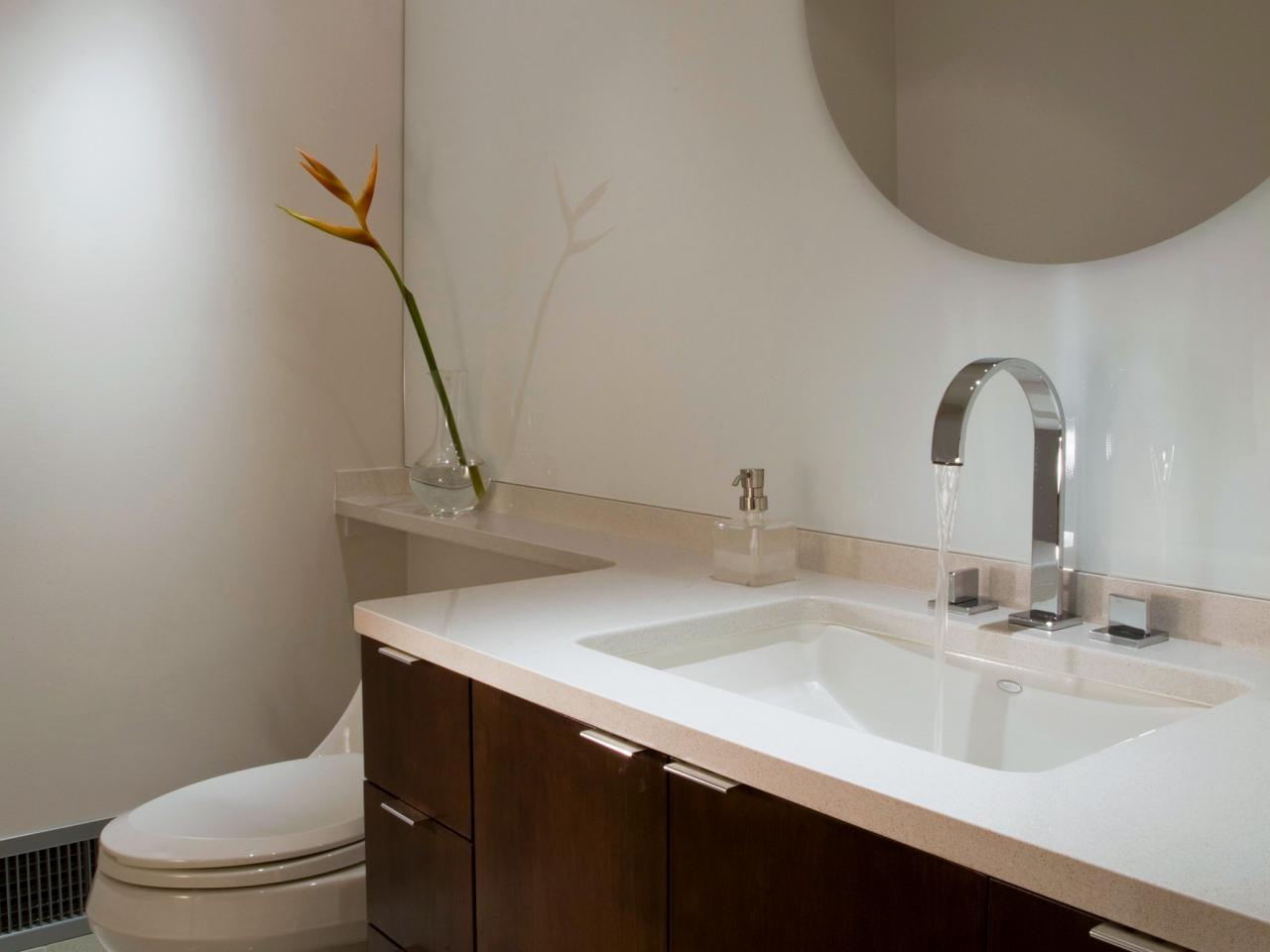
Common Mistakes to Avoid
When selecting and installing bathroom countertops, there are several common mistakes that homeowners should be aware of to ensure the best outcome. One of the most frequent errors is choosing a material based solely on appearance without considering its practicality and maintenance requirements. For example, while marble may be beautiful, it is also porous and susceptible to stains, which may not be ideal for a high-traffic bathroom. It’s important to consider how the material will perform in a bathroom environment, taking into account factors like moisture, heat, and daily wear and tear.
Another common mistake is underestimating the importance of proper sealing and maintenance. Natural stone countertops, such as granite, marble, and soapstone, require regular sealing to protect against water damage and staining. Failing to seal these surfaces properly can lead to long-term damage and costly repairs. Additionally, neglecting routine maintenance, such as cleaning and resealing, can result in countertops that quickly lose their luster and functionality.
Incorrect installation is another potential pitfall. Installing a bathroom countertop requires precision and attention to detail, particularly when it comes to ensuring a level surface and secure attachment to the base cabinets. Improper installation can lead to issues like uneven surfaces, gaps between the countertop and walls, and insufficient support for heavy materials like granite or concrete. These problems not only affect the appearance of the countertop but can also compromise its durability and safety.
Aesthetic mistakes can also occur when selecting countertop materials. It’s important to consider how the countertop will fit into the overall design of the bathroom. For example, a countertop with a busy pattern or bold color may clash with other elements in the bathroom, creating a disjointed look. It’s also important to think about the long-term appeal of the material. While trends come and go, choosing a timeless, neutral material can ensure that your bathroom countertop remains stylish and functional for years to come.
Finally, failing to budget appropriately for your bathroom countertop can lead to disappointment. High-end materials like natural stone, quartz, and terrazzo can be expensive, and it’s important to factor in not only the cost of the material but also installation, maintenance, and any necessary repairs. Cutting corners to save money on cheaper materials or DIY installation can result in a countertop that doesn’t meet your expectations in terms of durability, functionality, and appearance.
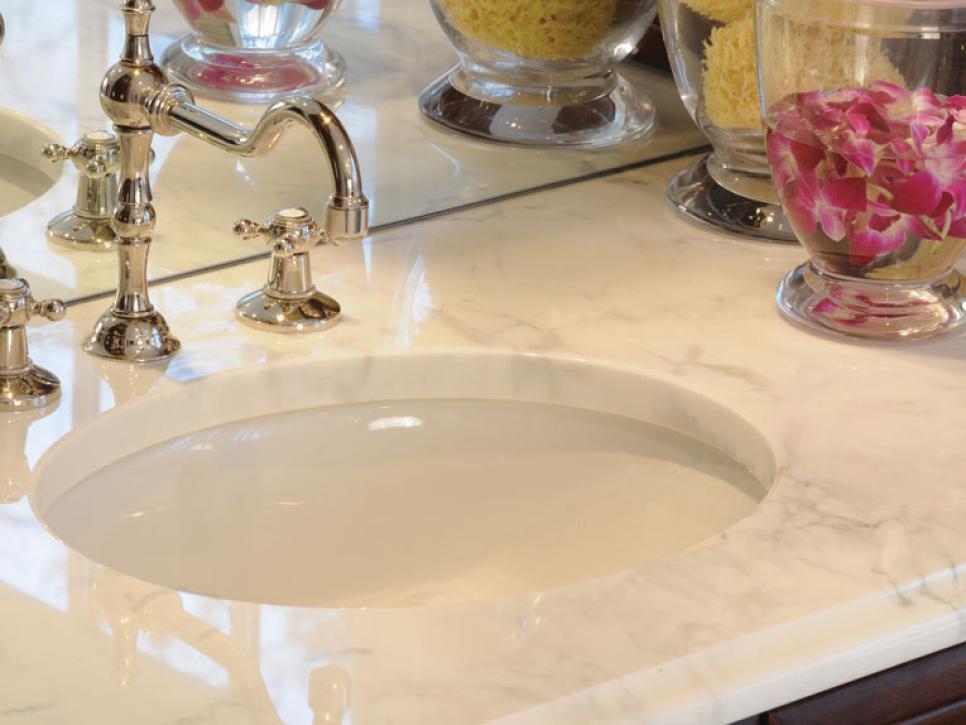
What is the most durable material for a bathroom countertop?
The most durable materials for bathroom countertops are natural stones like granite and engineered stones like quartz. Granite is highly resistant to scratches, heat, and moisture, making it an excellent choice for high-traffic bathrooms. Quartz, an engineered stone made from natural quartz and resin, is non-porous, resistant to stains, and requires minimal maintenance. Both materials offer long-lasting durability and are available in a wide range of colors and patterns, making them versatile choices for bathroom countertops.
How do I maintain a natural stone bathroom countertop?
Maintaining a natural stone bathroom countertop involves regular cleaning with a mild, pH-neutral cleaner and periodic sealing to protect the surface from moisture, stains, and bacteria. It’s important to avoid harsh chemicals, acidic cleaners, and abrasive scrubbers, as these can damage the stone. For daily cleaning, simply wipe the countertop with a soft cloth and a gentle cleaner. Sealing should be done every six to twelve months, depending on the type of stone and level of use. Promptly wiping up spills, especially from acidic substances like toothpaste or cosmetics, can also help prevent etching and staining.
Can I install a bathroom countertop myself, or should I hire a professional?
While it is possible to install a bathroom countertop yourself, it requires a good deal of skill, especially with materials like natural stone, quartz, or concrete. The countertop must be precisely cut to fit the space, and proper support and leveling are crucial to prevent damage over time. Installation mistakes can lead to costly repairs or replacements. If you are experienced with DIY projects and have the necessary tools, you may be able to install a countertop yourself. However, for more complex materials or designs, hiring a professional is often the best option to ensure a flawless finish.
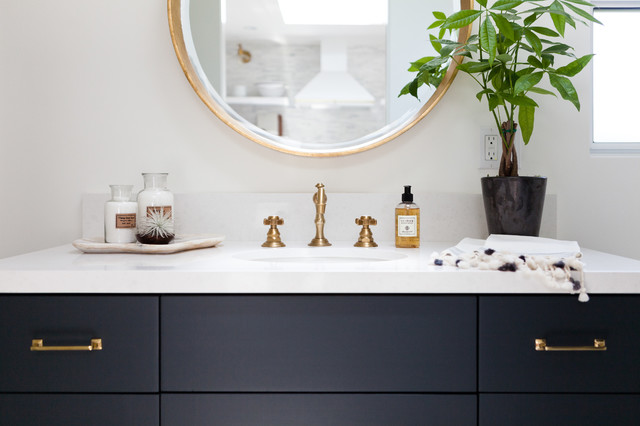
Are there bathroom countertop materials that are more eco-friendly?
Yes, several bathroom countertop materials are considered eco-friendly. Recycled glass countertops, made from post-consumer glass embedded in a resin or concrete base, offer a sustainable option with a unique, colorful appearance. Recycled paper countertops, made from post-consumer paper combined with resin, are another environmentally friendly choice that is surprisingly durable and low maintenance. Additionally, natural stone and wood countertops can be eco-friendly if sourced sustainably and maintained properly to ensure a long lifespan.
What is the best countertop material for a small bathroom?
For small bathrooms, a light-colored or reflective countertop material can help make the space feel larger and more open. Materials like quartz, porcelain, or glass are ideal for small bathrooms, as they are non-porous, low maintenance, and available in a wide range of light colors and finishes. Quartz and porcelain can mimic the look of natural stone while offering greater durability and ease of care. Glass countertops, with their sleek, glossy finish, can create a sense of depth and light in a small bathroom, although they require regular cleaning to keep them looking their best.
How do I choose the right color and pattern for my bathroom countertop?
Choosing the right color and pattern for your bathroom countertop depends on the overall design of your bathroom and your style. Neutral colors like white, beige, or gray are versatile and can complement a wide range of design styles, from modern to traditional. If you prefer a bolder look, consider a countertop with a striking pattern or vibrant color, but be sure to balance it with more subdued elements in the bathroom to avoid overwhelming the space. Additionally, consider the long-term appeal of the color and pattern; while trendy options may be appealing now, a timeless design will ensure your bathroom remains stylish for years to come.
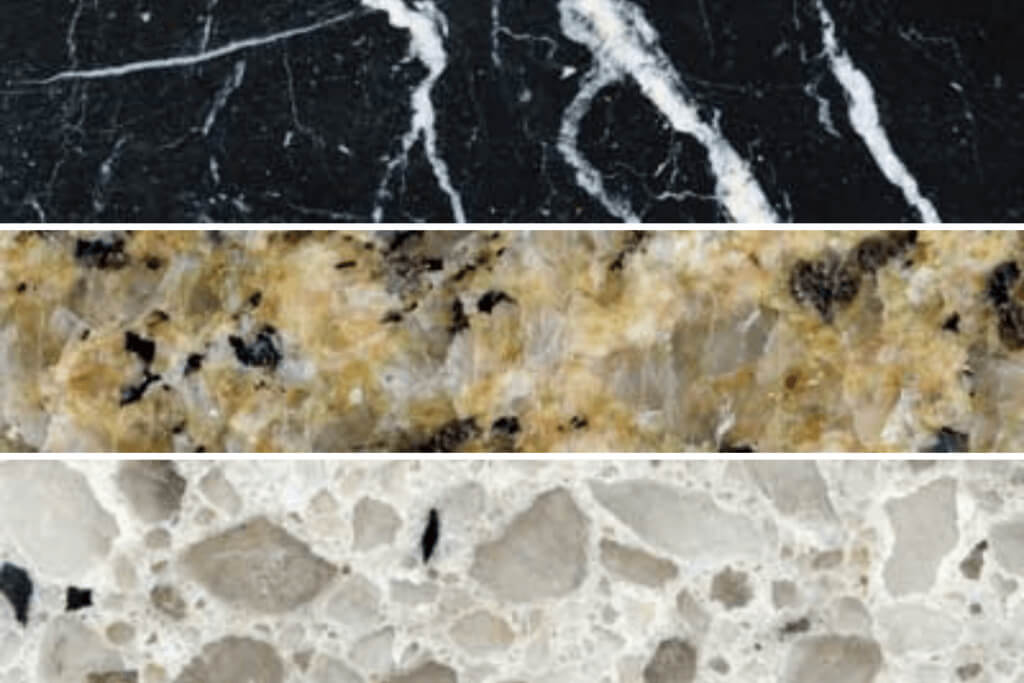
Best Bathroom Vanity Tops
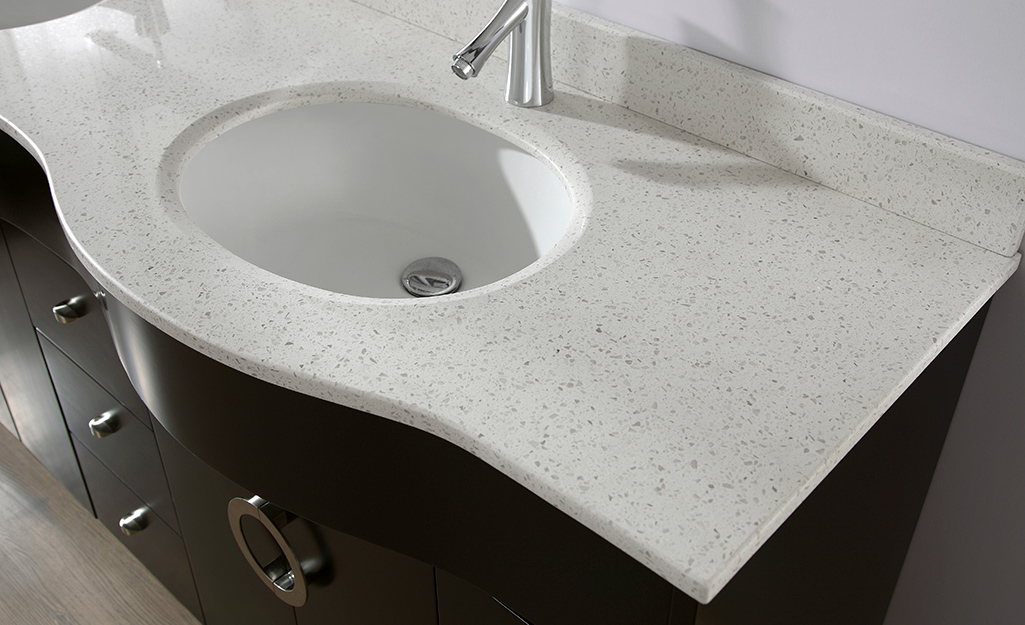
Choosing Bathroom Countertops
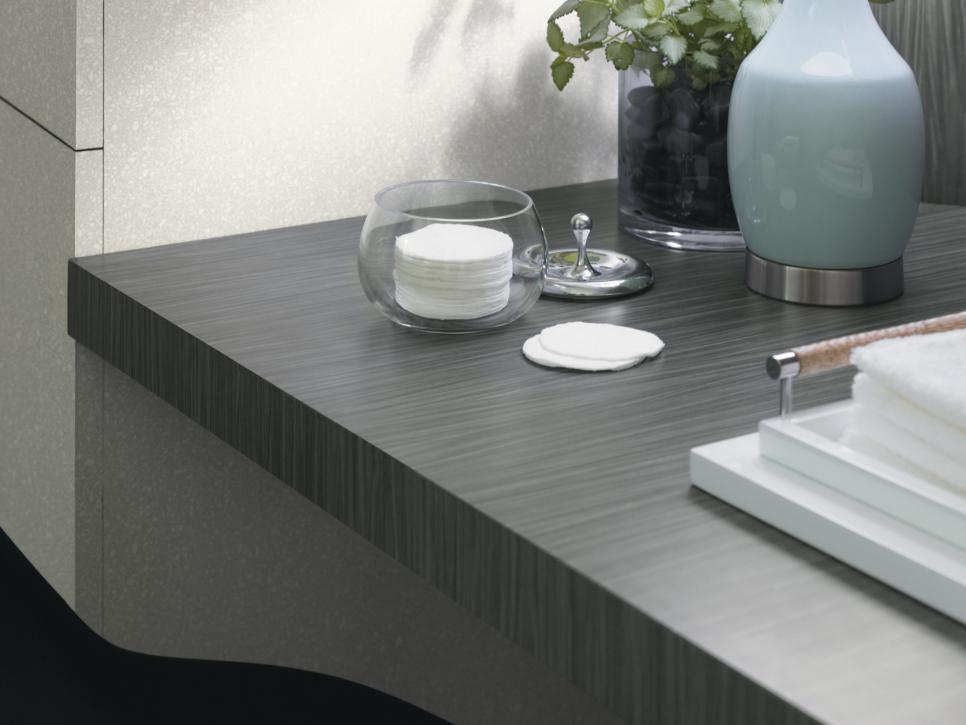
Bathroom Vanity Countertops: Which Material is Right For You
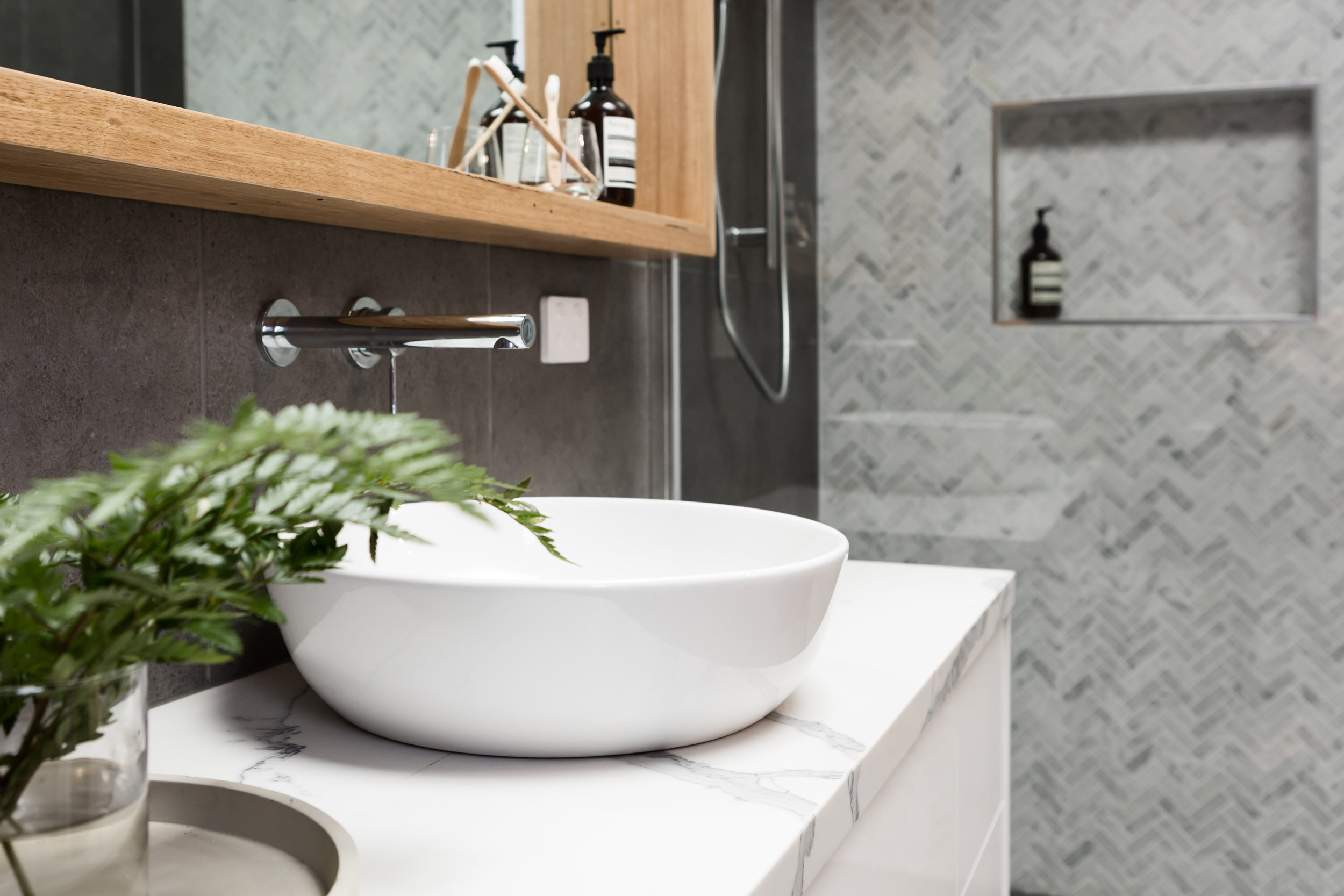
Related articles: